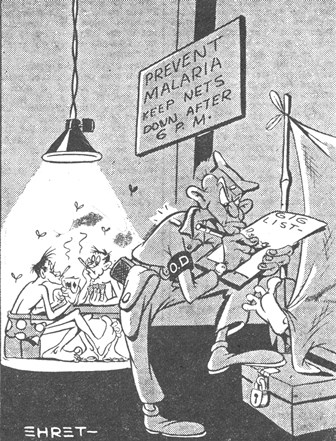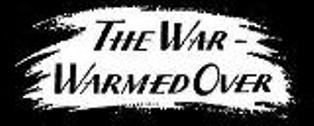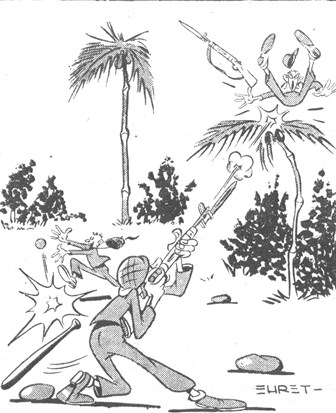|
|
JAPS ACCEPT ALLIED TERMS;
MACARTHUR SUPREME HEAD

Russian Armies Push Deep Into Korea And Manchuria As Nipponese Quit Acting with their usual speed and power, Soviet Armies wasted little time in pushing into Manchuria and Korea this week after Russia declared war against the tottering Japanese August 8. Breaking through at several points along a 300-mile line from Hutou to Hunchun the Russian steamroller reported only "moderate" to "meager" opposition, despite previous stories that the Japs had their best armies in the area. The Reds attacked both the East and West borders of Manchuria and into Korea, indicating a giant pincers operation. Within three days after the declaration of war, Soviet troops had fought their way more than 200 miles inside Jap-held territory, with the main attack down the Chinese Far Eastern Railway. The railway town of Hailon was reported captured and heavy fighting is in progress beyond the Khingan foothills, natural barrier protecting the important Nip arsenal and rail center of Harbin. Soviet columns are within 350 miles of Harbin. 1,000,000 SOVIET TROOPS On Sakhahn Island the Red Army has penetrated Jap territory and "fierce fighting is in progress"
Russian marines, protected by the Soviet Fleet, poured ashore on Korea, capturing the Nip naval base at Rashin. Military observers estimated this week that the Soviet Far Eastern Army is composed of at least 1,000,000 troops back by a substantial air force. The Japanese, it was estimated, have about 2,000,000 troops spread through China, Manchuria and Korea, including the Kwantung army, believed to be Japan's best trained and best equipped force. ‘TOO BUSY’ Moscow, in one of its few statements about the war, announced that Marshal Alexander Vasilevasky is the top commander of the Far Eastern Army. Under him are Marshal Rodion Malinovsky and Marshal Kirill Meretskov. All three are veterans of the war against Germany. Russia's declaration came as a surprise to most of the world including the japs, who had matters atomic on their minds. Just seven hours before Foreign Minister Molotov announced a state of war. Hong Kong radio confidentially announced that Russia was "too busy" to join the conflict. |
Emperor Will Be Subject To Orders Of Commander
President Truman officially announced at 5:30 a.m. Delhi time, August 15, that Japan had accepted the Allied terms for unconditional surrender without qualification. The President followed up his announcement by ordering an immediate cessation of hostilities.
The President stated that the surrender would be formally accepted by Gen. Douglas MacArthur, whom he designated as Supreme Commander for the forces of occupation. Truman added that V-J Day will not be proclaimed officially until the official surrender documents have been signed.
Japan was ordered to send emissaries to meet with MacArthur at the time and place designated by him, at which place Japan formally would be put under the surrender terms.
The Japanese acceptance was transmitted to the United States by Switzerland whose Legation in Washington handed the answer of Japan to Secretary of State James F. Byrnes. The State Department head hurried to the White House with the message.
More than 150 reporters crowded around the Chief Executive as he made the official announcement. Surrounded by his Cabinet, the President gave the American people the news for which they had long awaited.
The Japanese reply stated that the Emperor had issued an Imperial Rescript authorizing and insuring a signing by the Japanese Government of the Potsdam Declaration. It was stated Hirohito would issue the command to surrender and other orders as required by the Supreme Commander.
As news of the announcement was broadcast, crowds gathered around the White House shouting, "We want Truman!" Addressing the cheering citizens of Washington, Truman told them that we finally had arrived at the great day for which we had been waiting since Pearl Harbor. He warned that ahead still loomed the great tasks of insuring peace and implementing free governments throughout the world.
The President later proclaimed August 16 and 17 as legal holidays in the U.S.
A nationwide celebration took place in the U.S. Sunday night following broadcasting of a United Press flash stating Truman had announced Japan's acceptance of the terms. United Press head Hugh Baillie claimed the bulletin had been inserted on the wire by persons unknown and did not originate in one of his offices. He offered $5,000 reward for identification of the sender of the message as federal agents investigated.
The flash was killed within two minutes but the damage had been done as radio stations interrupted programs from coast to coast to broadcast what was on the surface an official announcement. In some cases celebrants did not learn until hours later that the flash had been untrue.
The Japanese peace offer followed right on the heels of President Truman's report to the nation, in which he warned Japan that if she did not surrender, atomic bombings would continue.
First word of the surrender offer came from Tokyo radio, which stated Japan was willing to accept the Potsdam ultimatum providing the sovereignty of Emperor Hirohito was guaranteed. The offer was formally transmitted to the U.S., Britain, Russia and China through Swiss diplomatic circles.
The U.S. Government, acting on behalf of all the major Allies, answered that the authority of the Emperor must be subject to the authority of the Allied military commands. The position of the Emperor was defined as follows:
"From the moment of surrender the authority of the Emperor and the Japanese Government to rule the State shall be subject to the Supreme Commander of the Allied forces, who will take such steps as he deems proper to effectuate the surrender terms."
The note added that the ultimate form of government for Japan would be established "by the freely-elected will of the Japanese people." It added, "The Emperor will be required to authorize and insure the signature by the Government of Japan and the Japanese Imperial General Headquarters of the surrender terms necessary to carry out the provisions of the Potsdam proclamation."
The reply stated that the Emperor shall issue his commands to all Japanese military, naval and air authorities and to all forces and cease resistance.
The reply to the Japanese peace offer came after consultation among Washington, London, Moscow and Chungking. President Truman called an immediate cabinet meeting as soon as he received the official communication from the Nippon Government.
The Japanese overseas Empire stretched from the Artics to the tropics in 1942. But the Japan of 1945 will measure only 148,756 square miles in area, 1,100 miles in length and in that restricted space will be at least 70,000,000 people or 500 persons per square mile. The population of the U.S. only averages 44 persons per square mile.
Under the Potsdam formula Japan must surrender Manchuria, Korea, Kwangtung Peninsula, southern half of Sakhalin island, Formosa, the Pescadores group of islands between China and Formosa, the Ryuyku Islands, the Marshall, Caroline, Marianas and Palau Islands and the Sprately Islands. In addition she forfeits all her Greater East Asia Co-prosperity Sphere, which means she must withdraw from Malaysia, Burma, Dutch East Indies, Borneo, Indo-China, Thailand and China.
The long years of imprisonment behind barbed wire for 41,000 U.S. civilians and 26,000 U.S. Servicemen were seen close to an end. It has been announced that Japan must speedily expatriate all Allied nations. The outstanding U.S. military personage in their hands is Lt. Gen. Jonathan Wainwright, who surrendered Corregidor. He was last heard of in Mukden, Manchuria.
There were premature armistice celebrations from London to Okinawa. On Okinawa, where Gen. Joseph W. Stilwell's 10th U.S. Army was preparing for the invasion of Japan, enthusiastic G.I.'s fired ack-ack rifles and mortars. Six men were killed by falling ack-ack and 24 were wounded.
It was emphasized by the United Nations Relief and Rehabilitation Administration that no help will be given to Japan. UNRRA made this clear as it moved swiftly to put into force a tremendous relief program as soon as the Far East is liberated.
How Peace News Came To India-Burma
By SGT. ART HEENAN Roundup Staff Writer
The story of the Japanese acceptance of the Allied surrender terms as it came to India-Burma G.I.'s almost went down in history as The Great Snafu.
The first flash came over British Broadcasting Corporation, which stated around noon, Delhi time, on Monday, that a monitoring of Tokyo radio revealed that the Japanese Cabinet meeting had concluded. Tokyo radio said the Potsdam Declaration had been discussed.
At 12:21 p.m. the Far Eastern Bureau, formerly the British Information Service, monitored the Japanese radio to overhear a statement that the Tokyo Government was soon expected to announce its acceptance of the Potsdam Declaration.
To complete the sequence, at 1 p.m. Roundup reporters at the Statesman were handed a Reuters dispatch, which stated that the United States Office of War Information had interpreted a statement by Domei, official Nip news agency, to mean that Japan had accepted the Allied terms as transmitted to them by the U.S. This was the first definite indication that the enemy had accepted the Allied proviso that Emperor Hirohito would be subject to the dominance of the Supreme Allied Commander.
The Roundup attempted to check the OWI version but the India-Burma branch of the government agency had no information. Our British friends put their facilities at our disposal but there was still no firsthand or official confirmation that OWI had actually stated Japan had accepted the terms.
In the meantime, officers and men of the U.S. Forces swamped the Roundup and telephone lines of the India-Burma network of the U.S. Armed Forces Radio Stations throughout the Theater to confirm the British reports. The American stations, however, restricted to only official news and lacking any definite word from Washington, could not touch the Domei statement.
Then came a BBC broadcast at 9:30 p.m. that Washington and London had both received the Japanese reply to the surrender ultimatum. It was stated that as soon as the messages were decoded, simultaneous releases would be made in all "Big Four" capitals.
Half an hour later, radio personnel in the Theater, heard a further BBC broadcast, which announced that the U.S. had stated fighting was continuing and that further atomic bombings and invasion loomed for Japan unless she surrendered. It was later decided this version had been recorded earlier, then re-broadcast.
At 12:30 a.m. on Tuesday, station VU2ZY at New Delhi heard the Armed Forces Radio Station at Boston proclaim that the U.S. had not received the Japanese reply as yet. Boston conservatively noted that the situation was "somewhat confused." Boston then quoted a Domei report that Japanese nationals in Tokyo had assembled before the Emperor's Palace and bowed down because their efforts had not been enough.
A check with Reuters revealed that at 9:30 p.m. Indian time they had received a flash that the Jap reply had been received in London and Washington. The White House press secretary, Charles Ross, was quoted as the source with further announcement that the message would be announced as soon as it could be decoded, which would take about two hours.
Three hours later, the U.S. Armed Forces Radio said the White House had not yet received the message, using the same Ross as their source.
At 1:30 a.m. Army News Service stated the situation was "thoroughly confused."
There was no further news throughout the early hours of the morning. Then suddenly at 5:30 o'clock the statement of President Truman confirming the surrender unexpectedly boomed over the ether. The India-Burma network made a recording and re-broadcast it to personnel throughout the Theater.
The long vigil was ended. As tired Army radio and newspaper men relaxed over a cup of coffee it was announced that August 16 and 17 would be legal holidays in the U.S. with all war workers who had to remain on the job entitled to overtime.
For the India-Burma Theater, peace was now plainly in sight.
PEACE - IT'S WONDERFUL!
AGRA - Red faces were many here last Saturday morning when U.S. Army personnel awakened to discover the "victory celebration" they had observed the night previous was slightly premature.
Agra monitored the radio station at Chungking, China, and when it was understood that the Chinese capital was celebrating the surrender of the Japs, this base decided to join the jubilation.
Col. I. G. Siemens, base commander, announced the "surrender" on VU2ZW, local G.I. radio station.
Officials at Agra coughed embarrassedly the following day and mumbled something about "Hell, it could happen to anybody."
So it dis at Chungking, Okinawa, and London. Scattered celebrations were held in Times Square, New York City.
(While there was no official recognition of surrender at Delhi, many excited officers and G.I.'s learned from various "pipelines" that the Japs had quit and touched off scattered celebrations.)
|
Score May Be Cut Low As 50 Roundup Staff Article
Plans to cut the size of the Army to 3,000,000 men by a year after V-J Day are ready, stated the Associated Press this week, as United Press forecast that the point score may be cut to as low as 50 points following the surrender of Japan.
Informed sources told the Associated Press that peace would probably bring a stepped up demobilization program, but that there would be no immediate wide scale discharges. It was pointed out that the Japanese homeland and islands formerly Japanese held, will have to be occupied.
It was stated that the Army does not intend to take any unnecessary chances that some Japanese troops may not comply with the surrender order. It was pointed out that about 2,000,000 Japs will have to be disarmed in the home islands alone.
If all goes well in the occupation of japan, informed sources said that there should be no more than 3,000,000 left in the Army by a year after V-J Day. It was stated that the Army will probably make an immediate cut in the critical score to permit 2,000,000 in all to receive discharges.
The United Press pointed out that it may be some time before the average soldier is able to don civilian clothes due to the tremendous demobilization job. United Press explained that in the three months since V-E Day only 750,000 men out of 3,000,000 have been brought back from Europe. Shipping space is a tremendous problem, stated United Press.
United Press said it was also possible that preference may be extended to older men or men with families. The War Department has stuck to its point system to date and has refused preference because of age or family obligations.
United Press also stated this week that only 40,000 more men have been released from the Army under the point system than were drafted since V-E Day. Figures show that 250,000 have been discharged under the point system while 210,000 were drafted.
The Army also discharged 150,000 more due to physical unfitness or age, thus adding up to a total drop in the Army's strength of only 190,000.
Convoy Drivers Happy, Calm As Peace Rumor Celebrated In Kunming
By SGT. JOHN McDOWELL Roundup Staff Correspondent
KUNMING, CHINA - Kunming is nursing a lot of premature peace "headaches" this morning (Saturday).
The city awakened today to learn that the peace it had celebrated last night was still unconfirmed by Washington. But for a few frenzied hours all Kunming - Americans, Chinese, British, French and the rest of the polyglot population - tasted the heady wine of victory.
A million firecrackers crackled, as all the city's 200,000 population seemed to mill up and down the rough cobblestone streets. Roman candles arched fiery balls into the night. Long queues of men, women and children filed through the streets, laughing and shouting the good tidings.
News bulletins printed on brown rice paper were pasted in shop windows and on walls, and Chinese clustered about, reading the big red characters over and over.
Here and there in the crowded streets, an exuberant G.I., bolstered with vodka, Chinese wine or gin, would race past pulling a rickshaw with a self-conscious coolie passenger.
At the downtown Red Cross club, a boisterous Army captain stood on the steps and shouted to the passing crowd: "The war is over. The war is over."
When asked if the news was authentic and where he had heard it, the captain sputtered indignantly, "Hell, yes, it's true. The Red Cross girl inside just told me."
The first report of impending peace was received in the Signal Corps message center in the Red Cross building a few minutes after seven o'clock last night. Within an hour, the news had spread over the city and to outlying Army installations. At 10 o'clock the Kunming Army radio station broadcast a report - later to prove unfounded - that President Truman, Admiral Nimitz and General Wedemeyer had confirmed the declaration of an armistice.
Sales in the local liquor stores promptly hit a new high.
I-B DRIVERS HAPPY
But while thousands celebrated, G.I.'s on duty carried on with the war. Out at the ATC passenger terminal, I found a group of Negro QM convoy drivers waiting for a plane to take them back over The Hump to Assam.
|
BRONZE STARS TO RADIO TRIO Three members of a radio team that recorded happenings in the old China-Burma-India Theater, and still are carrying on in the I-B, received Bronze Stars recently from Lt. Gen. R. A. Wheeler. The trio were Capt. Finis Farr, Capt. Bert Parks and S/Sgt. Harold Lemke. Farr was writer-producer and officer-in-charge of the team that operated on bombing raids, over the Stilwell Highway, over The Hump and behind the Jap lines in Burma with OSS units. Parks, former CBS announcer, did the vocal descriptions and interviewing. Farr, formerly affiliated with March of Time, did the writing and production planning, while Lemke handled the technical end of the jobs. |
T/5 Robert Rudrow, of Red Bank, N.J., was "damned happy it's all over, but we still gotta fly that Hump. Sure hope nothing happens not with the war over."
T/5 Shannon Stallworth, of Defunick Spring, Fla., was all grins. "Just too happy to even worry about flying The Hump now," he said.
This outfit has been pushing trucks up and down the Stilwell Road in India, Burma and China for the last two years.
S/Sgt. Richard Reese, of Los Angeles, said, "Here's hoping we've made our last convoy haul."
Cpl. Robert King, of Philadelphia, and T/5 Charles Hill, of Lexington, Ky., were both thinking along the same lines. "Wonder how long it will take the Army to get us home," was their first thought when they heard the news.
NEWS HIGH UP
T/Sgt. Robert Griggs of Nashville, Tenn., radio operator on a C-54 flying The Hump run from Kurmitola, India, received the news high over the jagged peaks of Yunnan.
"I got the news at 1324 Zebra Time from Fox Charley Airways," he explained to me in his best airline jargon.
A veteran of 33 B-24 raids over Europe. Griggs has been in the Orient since last December, has made 40 flights over The Hump. His plans: "I am going to get my wife and then we are going to make a long trip, just loafing for a couple of months."
Capt. Vincent (Mike) Ring, pilot of the big ship, described the reception his crew gave the news while cruising at 16,000 feet.
"All of us started hollering and pounding one another on the back," he said.
And "Lt. Philip Ditillo, of Oakville, Conn., the co-pilot, said, "Brother, I felt like dumping our cargo of gasoline and turning around for dear old Uncle Sugar."
S/Sgt. Donald O. Triplett, of Parkersburg, W.Va., flight engineer, zipped his jacket tight against the light rain which had been falling throughout the evening. And, before sloshing through the mud to check the plane for the return flight to India that night, he said, "Thank God, I will be home soon."
By SGT. ART HEENAN Roundup Staff Writer
The night the first B-29's landed in India in 1944, American field personnel rubbed their hands and whispered, "Wait until the Japs see these babies. Will they be surprised!"
But it was the Americans who were surprised. For the next night Tokyo radio not only flaunted the number of the hitherto highly-secret Superforts that had arrived, but also boastfully broadcast the numerals on their tails.
In another case, amazed G.I.'s at an India installation returned from a dance in time to hear the Jap radio tell their names and the names of their dancing partners. The Nips even named several of the tunes played at the dance, with the comment that the music was "corny."
The information obviously came from sources at or near the American bases in question. To prevent occurences like this the Army has in this Theater and all over the world the Counter Intelligence Corps, known better as the CIC. Its mission is to keep enemy spies, saboteurs and subversive agents from working behind our lines and to prevent leakage of military plans and secrets to the enemy.
The CIC is composed of former FBI men, newspapermen, attorneys, bankers and law enforcement officers, all specialists in civilian life. One office, for example, has better than half former FBI men. The CIC men go through at least three intelligence schools and these particular schools are generally run under an FBI routine, which is not conducive to turning truck drivers into chefs as is true of many Service institutions.
LINGUISTIC KNOWLEDGE
In the words of a CIC spokesman, "We learned everything from picking a lock to memorizing the height of a perimeter fence." Linguistic knowledge is a highly important factor in CIC work and most personnel are required to take courses in the world-famous Berlitz language schools.
Out here the CIC has employees who speak the various Indian dialects, Japanese, Chinese and Burmese. One associate is an Indian who formerly was a college professor in the U.S. But CIC work has been simplified by a close liaison with the British Intelligence, plus Indian and Chinese military and civilian police agencies, as well as other U.S. intelligence departments. CIC out here works under G-2 and was organized under Maj. D. E. Mackenzie. It is now under Maj. George L. Wilson.
Safeguarding the security of supply routes to China and preventing leakage about military movements have been the chief jobs of CIC in India. In Burma they were engaged in combat intelligence work, doing everything from interrogating Jap comfort girls to capturing an enemy Command Post and seizing two and a half trailer loads of confidential documents.
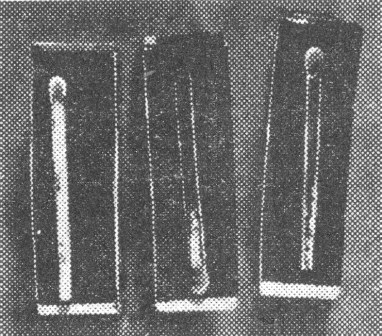 Here is a picture of some of the matches in the shipment from the States that caused the CIC in I-B three weeks of headaches. You can see how the loose matches adhered to the individual boxes and by rubbing against the abrasive striking surface, were ignited.
Here is a picture of some of the matches in the shipment from the States that caused the CIC in I-B three weeks of headaches. You can see how the loose matches adhered to the individual boxes and by rubbing against the abrasive striking surface, were ignited.
|
CARELESS PACKAGING
The CIC spokesman pointed out that many cases were just "routine drudgery." The outstanding "routine" case out here was probably that of a shipment of matches from the States. CIC received a wire from Washington telling of suspected sabotage.
The ship had already docked and the matches had been distributed around Calcutta, Ledo and Chabua. The CIC had to empty every one of the wooden containers in the 1,800 cartons. It was a laborious, cursing job, taking three weeks. It was discovered that the matches had been very carelessly packed, with individual matches between the wooden containers and liable to rub up against the abrasive on the sides of the containers and ignite.
But there was no evidence of any deliberate sabotage. So if you want to be held on suspicion just mention the word "matches" to a CIC operator.
One of the current security efforts to prevent sabotage is on the pipeline carrying gasoline and oil to China. The CIC has organized a village-to-village plan, under which people of each village are responsible for patrolling their own territory. This pipeline activity is not necessarily planned enemy action, but is in most cases outright theft which has the same effect as sabotage.
Leakage of information from talkative Americans has been a serious problem for the CIC. An American officer 100 miles from an air base over here heard two civilians telling about a contemplated USAAF raid the next day. He notified the CIC. It developed that two base officers had talked about the raid. They were court-martialed. One was acquitted and the other found guilty, receiving severe punishment.
JAP PLANE RAID
Another time Jap planes came almost to the landing strip of an AAF base in Burma without being detected. It so happened the detection equipment was out of order that particular day. It is believed that Japanese Intelligence had learned of the breakdown and taken advantage of it.
In another instance an officer disclosed in public movements of units and exact details about war material passing through India. When cautioned about discussing these matters the officer's reply was, "What the hell, you'll know about it pretty soon anyway." Punishment was administered under the 104th AW.
A close check is also kept on civilian employees over here through a fingerprint file and a list of undesirables. When a civilian employee is put on this list he cannot get a job either with the Americans or any of our Allies. Because of the fingerprint file it is impossible for anyone to work under an alias without being exposed.
CIC has at its disposal about the most complete laboratory for criminal and sabotage detection in the Far East, with an expert in charge of the intricate equipment. One case involved cutting of Army telephone wires. An inspection showed an intense flame from a blow torch or flame-thrower had been used. In a search of the area a foot print and a scrap of writing paper was found. A moulage (like a plaster cast) was made of the foot print and the writing on the paper was analyzed. Through these clues the case was solved.
HIDDEN MESSAGES
I stood in the laboratory and watched a former FBI-man develop a hidden message from what appeared to be an innocent letter. When the CIC man had finished with his work the hidden message stood out plainly to the naked eye.
To show how scientific devices are used on the most common cases we'll take the incident of an Army truck going into a wall. The brakes didn't work. A photo taken with a special lens disclosed that part of the hydraulic hose had been sawed off. Once sabotage was established it wasn't too difficult to trace the guilty party.
There are many cases of leakage due to what can only be called "out and out carelessness." Just recently the CIC found a classified U.S. Army document. It was being used as a vegetable bag in the Delhi bazaar. It was the third time in recent weeks they had found classified documents being used to hold Indian provisions. Now the bazaar is on the "must" list when trying to find the missing classified documents.
Another case of "carelessness" occurred in 1943. The CIC discovered that messages were being sent in the clear to China, telling the cargo and time of plane departures for over "The Hump." The messages were being sent by field telephone lines which paralleled the main highway. There was nothing to prevent the Japs from intercepting a message and sending fighters aloft the next day to knock down the planes.
The CIC came across some interesting cases in the Burma operations. To gain the confidence of the villagers, the CIC had to try for the impossible at times. Two agents were living in a village where there were two unexploded bombs. The village head man insisted that the pilot who dropped them should personally come and remove them. The bombs were removed all right, but the head man never knew that the men introduced to him as AAF pilots were really demolition experts.
GAIN CONFIDENCE
The CIC was stationed in isolated villages throughout the Burma campaign. In many cases they were the only Americans around. For transportation they used elephants, jeeps, mules and whatever was available. Supplies were air dropped and flown in by L-5's.
In many instances the CIC found Burmese forced to work against their will to do espionage work for the Japs. Agents went to one village and took two alleged spies into custody. When interrogated, one said, "Yes, we were spies. The headman of the village called us in and told us to work as spies. He said we would be killed if we did not obey. So he gave us one rupee each and some eggs and sent us to the neighboring village to see if any British or Americans were there. We went to the headman and told him we were spies. He said no planes had landed there, so we went back and reported. Then we quit being spies."
TWO-WEEK HUNT
The CIC often travelled long distances to catch collaborators and Jap agents. One or two CIC men would make the trip, with Burmese guides blazing the trail. In one instance an agent caught a spy after a two-week trip through the jungle by plane, jeep, elephant, boat and foot. By the time he had caught his man he had contracted malaria and jaundice.
Being in no shape to act as a guard on the way back, he managed to sell a snow job to the collaborator, inducing him to come back and tell his story on enemy occupation in Burma to aid the Allied forces. Together they started back "to aid" the Allies. Matters were complicated when the sick agent had to pick up three more notorious collaborators. When he arrived back at his base he was at the point of collapse.
There were all sorts of rumors and reports handed to the CIC both in Burma and India. One report came in from five sources that Jap stragglers were in the neighborhood. Two men were found. It developed they were Burmese elephant boys who had been rescued from the Japs by the British.
One report to Japanese Intelligence intercepted in Burma by the CIC demonstrated that the enemy paid for every conceivable bit of information including the price lists in zones recently taken over by the Allies. This report was intended for a Jap agent at Twinge. It was intercepted by a CIC agent soon after leaving the hands of a Burmese collaborator. Here is what it said:
LETTER INTERCEPTED
"I have been to Shwegu for investigation according to the instructions given me. Many English
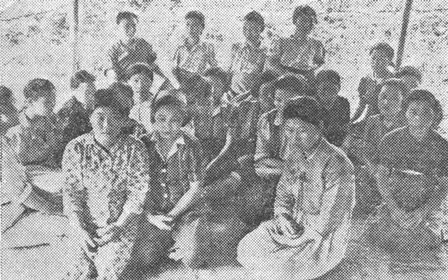 Here are some of the Japanese "comfort" girls captured by the Allied forces in Burma. These particular girls were captured after
the fall of Myitkyina and are mostly Koreans. It was the job of CIC to question these girls for informational purposes.
Here are some of the Japanese "comfort" girls captured by the Allied forces in Burma. These particular girls were captured after
the fall of Myitkyina and are mostly Koreans. It was the job of CIC to question these girls for informational purposes.
|
"We get a lot of false reports given in the best of faith," remarked the CIC spokesman. "But if we can develop one case we are willing to take a lot of false leads. We want to be known, for then we will get co-operation of the troops and they will report suspicious incidents to us. In one type of case handled by the FBI they had 19,000 reports and from those only developed 45 convictions."
The CIC is still operating among American installations here. Refugees returning to America are checked out. Incoming U.S. civilians are checked in. An educational program designed to teach officers and G.I.'s to confine their military talk to office hours is in effect, and espionage and sabotage is still being checked.
India-Burma Day Room Grows From ‘G.I. Dive’ Into Stateside ‘Jernt’
By CPL. RAY LOWERY Roundup Field Correspondent
Conclusive evidence that the briars and brambles of the I-BT are garrisonized at last are the streamlined organizational day rooms which during the past year have mushroomed up from Karachi to Kunming, replete with every Stateside bistro feature save neon marquees and a jukebox in technicolor.
Newcomers to mother India are likely to feel that the day room is a recent innovation here, but it ain't - necessarily. For back in Uncle Joe's day the base and depot units hereabouts tossed together some of the most bizarre palaces of relaxation this side of the Casbah.
Speaking as a soldier who has whiled away many a miserable hour in one of the GS (government scrap) dives, I feel as though I am qualified to speak with some degree of authority on the nomenclature of same.
Placarded across the door to the day room in my old outfit was a poster which read: KEEP YOUR TRAP SHUT. YOU SHIP-SINKER! On the inside was another that read: THE FLIES HERE ARE A BITTER PILL, AIN'T THEY, CHUM?
ONLY 15 KEYS
The day room also had a piano, presented to the squadron by a motherly tea planter's wife. Only about 15 of the keys would make any noise, but that was more than enough for our hunt-and-peck virtuosos.
There was a radio, too, this static-snatching piece of electrical junk having been donated by the boys in signal repair. It picked up every station in the South East Asia Command, except those using the English language.
And the books. Ah, those immortal masterpieces of contemporary Oriental literature. Among them were The Sex Life of the Hindu, Go Ye and Sin No More, All Women Are Jades, Life Was My Undoing, and 20 Years in the Oldest Profession. But the book most in demand was that nationally popular favorite - the Forever Amber of India - Escapades of Erotic Edna, "a story of the passion and adventure of a beautiful German Jewess." The Roundup arrived infrequently, if at all, but pre-war copies of the Hindustan Standard could always be had.
For those of us not musically or intellectually inclined, there were games to flush our morale and stunt the progress of jungle rot. In the center of the floor was a broken-down billiard table, thought to have belonged to Clive of India. The cue sticks were made of bamboo, the balls as warped as a kite's egg, and the table torn in several strategic places. But everybody kept telling himself it was as fair for one as it was the other.
PAINTS WITHOUT BRUSH
Situated in the rear of the lounge was a ping-pong table. It was a nice table, all right, and we were damned proud of it. The trouble was that we had never met anyone who had played a game on it. No matter when you visited the day room the same two ginks would be in there batting the old celluloid around.
Squadron funds were often used to improve the day room. One morning the unit supply officer gave a handful of rupees to one of our doughs and asked him to go into town and buy some needed equipment. After putting away the better part of a quart of Carew's, the guy barged into a market place and bought a sack of lime, then returned to the base and painted the interior of the day room - sans brush. He was ordered to rectify his handiwork and obliged by whitewashing the mosquito netting on the windows. They gave him three months, but he finally got rotated.
Some time later a contest was held to find the best day room on our base. All the guys who were browning for something went to work on the horrible hangout, confident we'd win the first prize, which was an incredible amount of money. Some 12 or 15 rupees.
STUFFED SKULLS
First thing we did was to build an artificial fireplace, a novelty in India and a feature sure to pique the imaginations of the war-weary judges. In front of the fake fireplace we placed an over-stuffed charpoy decked out in colored parachutes. Within easy reach was a lounging robe, a mint julep (a la Chabua), a watch dog, a pipe and a "good" book. An electric fan was installed in the fireplace and punkas (fans to you new kids) strung along the ceiling.
Barring none, our day room was hot stuff until another squadron got wind of what we had done and set about building a log cabin lodge, Boy Scout style. The walls were covered with Hessian cloth, carbines stacked in the corner, and the skulls of monkeys and jackals stuffed and mounted over the door.
That made us a little sore, so we asked the first sergeant to move his quarters out of the day room, enlarged the interior and established a Stateside nightclub with an Oriental atmosphere. Calling on our famed ingenuity and resourcefulness, so often exploited in the Roundup, we managed to secure tables and chairs, silverware and foodstuff - most of this while the mess sergeant was at rest camp. A Hindu band was engaged and the Red Cross girls agreed to occupy our harem on the day the judging was to take place.
COULDN'T FIND IT
Then the rival squadron slipped up. One of its personnel got the bright idea of camouflaging their day room to impress the colonel, an old camoufleur. Cow dung was flung (justifiable rhyme) on the sides of the basha, grass planted, trees set out and a few cigarette butts and match stems scattered about. It was a magnificent job, but it was too good. The judges never found it. The guys themselves are still looking for it. We won, hands down.
The night and day room of this day is a cool, quiet and refreshing place to visit. But I often wonder if it wasn't more fun - there I go - but it was fun to see a man pour his 10th beer on the floor, then sit down in it. Ah me. Let's save the rest for the first VFW convention.
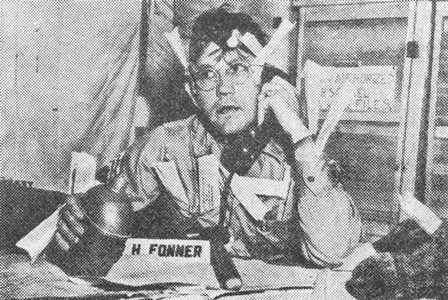 Atomic bombs? A mere nothing compared to the tally-out troubles of M/Sgt. Robert H. Fonner, chief statistical clerk in Kunming,
China. Above, enmeshed in his own "file system," Fonner vainly tries to find a missing ice plant, tallied-in as an amphibious jeep.
(Photo By T/4 Frank Shearer.)
Atomic bombs? A mere nothing compared to the tally-out troubles of M/Sgt. Robert H. Fonner, chief statistical clerk in Kunming,
China. Above, enmeshed in his own "file system," Fonner vainly tries to find a missing ice plant, tallied-in as an amphibious jeep.
(Photo By T/4 Frank Shearer.)
|
KUNMING STATISTICIAN
GENUINE CHARACTER
DEAR BOSS: Here I am in legendary Kunming, the city of crowded cobblestone streets, sky-rocketing inflation, and pretty Chinese maidens with slit skirts that reveal interesting vistals of feminine territory. But, true to pattern, the strangest character I have met this far has been an IBT-er.
The character in question - one M/Sgt. Robert H. Fonner, late of Washington, D.C. - once upon a time doubtlessly was as normal as Spam in a G.I. chow line. But that was before he became chief statistical clerk in the Kunming Motor Transport Service office.
The first time I saw Fonner he was loping down the convoy parking area at a mad pace, leaving a trail of vari-colored tally-outs fluttering confetti-like in his wake. He approached me, skidded to a stop and grabbed my arm frantically, "The ice plant," he panted, "We've lost the ice plant." Then, without further explanation, he galloped on.
The next time I saw Fonner he was seated at a big desk heaped high with papers. His head was bowed in abject despair and he muttered to the world in general: "Why do they keep tallying in four-ton trailers as amphibious jeeps? It's all so simple. Why can't they get it straight?"
I finally cornered Fonner in the mess hall. While passing him the canned cow, I broke the ice. "Look, pal," I said. "What's all this business about ice plants and amphibious jeeps and four-ton trailers? Why don't you take it easy?"
"Ice plants and jeeps - they're small parts of my burden," he confided. "You think the Japanese fleet has troubles? Just listen to me."
Whereupon, Fonner ripped asunder the veil of obscurity that has left the trials and tribulations of the Army statistical clerk unpublicized, his efforts unsung.
"What happens to a statistical clerk shouldn't happen to a dog," he began. "Take me for instance. I have to keep records and report on all China-consigned and organizational vehicles arriving in Kunming. I have to keep another set of records on all China-consigned and organizational vehicles arriving in Kunming. I have to keep daily records and the daily reports on convoy losses and progress on convoys enroute to Kunming. I have to keep records and make reports on all personnel coming into China via convoy."
Fonner paused for a breath, then went on. "And not only do I have to worry about those records. Every day Ledo calls and says, "Fonner, why haven't you filed a report on Convoy No. so-and-so reaching Kunming?"
"And when I tell them that Convoy so-and-so is still in Paoshan, they reply, "Well maybe so." And then they hang up. But not for long. Ten minutes later, right when I'm in the middle of checking in a convoy, Ledo calls again.
"Fonner," says the same voice, "Where in hell are the reports on Convoy such-and-such?"
"When I tell Ledo that the records on Convoy-such-and-such were in 10 days ago, there is a pause. Then the voice says in a matter-of-fact tone, "Oh yes, here they are. Right under the box of Tootsie Rolls I bought in the PX a couple of days ago. Sorry, Old Man."
"And when I hang up the phone I find that a damned gust of wind has blown all the sorted tally-outs off my desk. And I have to begin all over again."
Fonner has a lot more troubles, too, Boss. There is nomenclature-itis, for instance. Here, British lorries are checked in on convoy manifests as road graders; ice plants are checked in as weapons carriers; jeeps are checked in as 60-mm mortar shells, M-1. These mistakes in nomenclature are the bane of existence for every statistical clerk and offer the best-known shortcut to Section Eights.
Yes, Boss, the life of a statistical clerk is a tough one. They should get some sort of an award. Something like a gold-plated tally-out form or a velvet-lined strait-jacket. - Your faithful leg-man, ABERCROMBIE.
New Community Born In Captured Liuchow
By SGT. JOHN McDOWELL Roundup Staff Writer
LIUCHOW, CHINA - Today, one month after the Chinese armies re-occupied this centuries-old city on the broad Liu River, a new community is rising from the fire-blackened shell of rubble which once was Liuchow.
The story of the re-birth of Liuchow is significant. For here on the fertile Central Kwangsi Province plain, the first milestone on the long road home for millions of Chinese war refugees has come into being.
Thousands of families already are moving along the road from Kunming and Kweiyang to Liuchow, a road of despair last year when these same people fled to the security of Yunnan's mountain country as the Japs swept into Kweilin, Liuchow and Ishan.
Now the refugees are returning, following on the heels of the advancing armies of the Chinese Republic. They move along the road day and night. They travel by truck and motor car, partly by ox-cart and mule, partly by foot.
CARRY BELONGINGS
With them they carry the meager personal belongings they have managed to cling to through long months of dislocation. For many of them Luichow is the end of the road. Here they are returning to the ruins of their homes and businesses, which they left when the Japs came. But for other thousands of refugees, Liuchow is merely the first mile marker that will eventually lead to Kweilin, Paochin, Nanchang, and on to the big cities of Canton, Hong Kong, Shanghai and Nanking.
Resettlement of Liuchow presents seemingly insurmountable problems. Yesterday, Sidney Quong of the Chinese Central News Agency, Gorge Wang of United Press, Sgt. Frank Shearer, Roundup photographer, and I toured both old and new Liuchow located on both banks of the Liu River.
In the two sections of the city, which had a peacetime population of nearly 100,000, we were unable to find a single building undamaged. Probably 90 percent of the city's buildings was a stark skeleton of masonry completely gutted by the Japs five days before they withdrew from Liucho in late June.
BOOBY TRAPS
Amid the ruins of the city, Jap mines and booby traps still are being detonated by unwary civilians, resulting in occasional casualties. Jap stragglers are still being picked up in and near the city.
However, returning residents of Liuchow are laying the ground work for their new lives in the ashes of their old homes and businesses. Men, women and children are clearing the streets and ruins of brick and charred timbers; restaurants and shops are open for business, although merchandise stocks are pitifully low.
Most of the sidewalk shops are stocked with inferior Jap goods, bearing reproductions of American trade labels such as Lifebuoy soap, Carter's pills, Clark's sewing thread, and Camel cigarettes.
Prices of food in Liuchow have remained reasonable, attributable chiefly to the fact that the Japs did not destroy crops in their retreat. Rice is approximately 60 cents a pound; pork, 50 cents a pound; eggs, 40 cents a dozen; chickens, $1.50 each.
FALLEN FRONTS
Walking through the desolation of Liuchow, I was accorded a vivid cross-section of Chinese family life. The fronts of most of the buildings have fallen, exposing the one-time privacy of the interior to the entire world. The same effect could be had by dissecting a crowded San Francisco tenement for the observation of the antics of the human beings who live there.
In the rabbit warrens of Liuchow, it is a common sight to see a merchant selling pots and pans and bamboo mats on the first floor of a building while overhead on the second floor his wife prepares a meal and children play on the floor, all apparently oblivious of the world outside.
But reminders of the days of Jap occupation still remain. In tall, red characters, one Jap Army signal warns the population that "to remove anything from these buildings is punishable by death," and another sign on a fashionable restaurant proclaims "for Japanese troops only."
The japs ruled with a heavy hand, residents who remained in Liuchow during the days of occupation told us slave labor was conscripted immediately for work on Jap installations. The wages were three bowls of rice per day.
WOMEN RAPED
All crops, livestock, and poultry were conscripted immediately for use on Jap installations. Those who objected were shot. Although the Japs brought their comfort girls into Liuchow, many Chinese women were raped.
But that is all past. The spirit of a people who wouldn't be beaten into submission is apparent on all sides. As two Chinese housewives who came across the river with us said, "Our families fled from Changsha when the Japs came. We stopped at Kweilin, then at Liuchow, then at Kweiyang. Now we are on our way back. Liuchow and Kweilin have been retaken by our armies. Soon they will be in Changsha again. Then, like the people of Liuchow, we can return to the ruins of our homes. chiodo che la terra e buona?
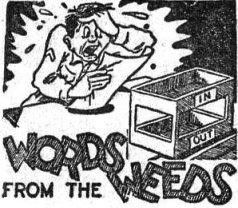
|
REPELLENT
Dear Roundup: I heard a Sad Sack say that insect repellent isn't any good.
I have found it very effective as a lubricant for old rusty hinges and zippers, leather softener, preventive against mold, fuel for lighters, alcohol burners, and, mixed with gasoline, it makes a red hot flame for melting purposes.
It is also excellent for athlete's foot, heat rash, piles, chapped lips (burns a little, but otherwise feels very refreshing), cuts, bruises, burns, hornet bites, base for massaging, metal polish and water repellent. - Sgt. Theordore Van Soelen, APO 218.
P.S. - We also use it for insect repellent.
POST EXCHANGE
Dear Roundup: We were annoyed at our station, probably at the end of the world's longest supply line, that civilian employees (non-American) are being permitted to purchase two carton s of the cigarettes of their choice per month. In addition, they are allowed to purchase from the PX such supposedly scarce items as Kleenex, Cannon bath towels, candy and chewing gum. About the only thing they cannot have, much to their dismay, is our much-cherished beer.
Now, the point is: For whom were these rations shipped over and how would our people at home feel if they knew about the final distribution of the commodities they have been doing without so that we could have them? - Sgt. Willis M. Mohn, APO 491. (Also signed by six others.)
PIPELINE
Dear Roundup: In a recent edition, one of your "donkey-eared" reporters had quite a time making fun of the Pipeline. Tell this "jerk white collar soldier" that a few of us boys would have enjoyed his company around last monsoon time. He would have found out how funny it was.
To that very versatile "pen pusher," the Pipeline personnel awards the coupling Cluster minus the cluster - right around his journalistic neck. - Sgt. John T Kenney, APO 218.
(The article in question was written by one of your own Pipeline men. It was not intended to prod fun at the hard-working Pipeliners, who have accomplished a truly magnificent achievement, but to underline a few amusing sidelights on their work on the theory that all work and no play makes jack a dull boy.)
FIELD SERVICE IN BURMA FILM
NEW YORK - (UP) - Burma Chapter, a 17-minute film depicting the work of the 250 American Service volunteers during the early days of the war in Burma, was presented to 350 persons in the Hotel Pierre this week prior to being circulated throughout the country under the auspices of the National War Fund.
Photographed in technicolor and narrated by John Whiteside, the movie disclosed that 14 percent of the 2,000 members of the AFS were either killed, injured or captured by the Japs. Seven hundred AFS volunteers are now in the Asiatic Theaters.
By SGT. CHARLES W. CLARK Roundup Staff Writer |
Several weeks ago this column innocently, and perhaps gullibly, carried an item to the effect that the 199th Ordnance Battalion was the heaviest War Bond buyer in the India-Burma Theater, its members having shelled out $7,805 during a recent bond campaign.
That issue of Roundup was hardly off the press when the editors of India Ink, base paper for the Eastern India Air Depot, wrote: "We beg to differ." Naturally. The editors then went on to say that personnel of the EIAD, during the period of May 10 to July 6, plunked down $22,458.75 for War Bonds, winning a commendation from Maj. Gen. Thomas J. Hanley for buying "twice as many Bonds as any other Air Force organization in the Theater."
If some outfit doesn't beat the EIAD figure by at least a nickel, we'll forfeit rotation.
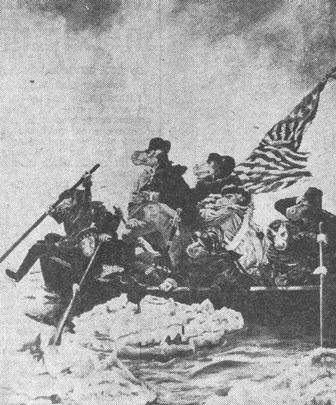
|

|
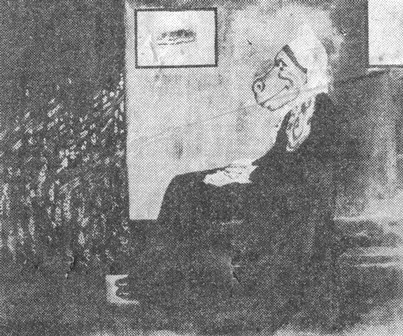
|
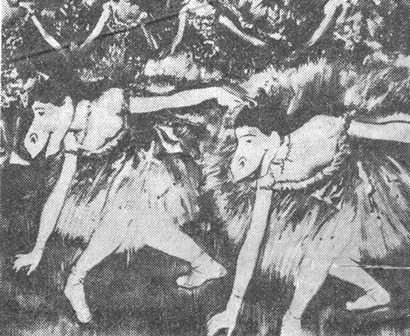
|
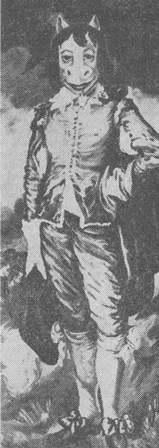
|
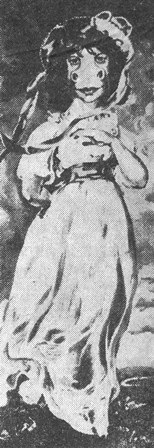
|
Of all the strangely delightful characters who have blessed the India-Burma Theater, there was one who stood out like a necktie at Walabum. His name was Theodore Sally. He was a corporal and, we think, a member of the United States Army. Every mess hall in Burma knew him well, for Ted was, among other things, a voracious chow-hound. Between trips to the kitchen, Ted "drawed some pitchurs" of damned near every G.I. along the Stilwell Road. Some of his work was reproduced in the Roundup under the heading, I-BT G.I.'s. Then one day Ted packed his brushes, ink, and Spam and went home. He was "war weary." But he's still drawing "pitchurs." Recently, the Spokane, Wash. Art Lovers Club needed some "culture paintings" for its annual Mother-In-Law's Day exhibit. Sally gave the club his kind of "culture," leavened with his kind of humor. This is his stuff scattered about this page. Top left photo is Sally's version of E. Leutze's "Washington Crossing The Delaware." Top right is what Ted thinks of Leonardo da Vinci's "Mona Lisa." Left center, "Whistler's Mother." Right center, Degas' "Two Dancers." Lower left, Thomas Gainsborough's "Blue Boy." And in the lower right, Sir Thomas Lawrence's "Pinkie." We don't understand the why of all the horses, but we imagine old "Super" Sally was just horsing around with the old masters.
Copeland Grabs 24th Ring Win
CALCUTTA - In one of the best crowd-pleasing fight shows ever to be presented at Calcutta's Monsoon Square Garden, more than 4,000 G.I. ring fans watched Ernie Copeland, the Bronx Bomber, soundly defeat Bill Matthews, Ledo, in a welterweight, three-round feature attraction on the nine bout program. Copeland, the India-Burma Theater welterweight king, tucked away win number 24 in 25 fights overseas.
Copeland's next opponent on the August 22nd All-American boxing show, will be Chester Martin, Tezgaon, the runner-up in the I-B Theater tournament.
Results of the preliminary bouts: B. Dass, Bengali BA, won on a decision over Patrick Kildaire, British Army (Flyweight); Thurston Cason, Chabua, decisioned P. Bose, Bengali BA (Featherweight); Wayne Simmons, Ledo, beat H. Paul, Bengali BA (Lightweight); Horace Wilson, Camp Howrah, defeated D. C. Chowdhury, Bengali BA (Lightweight); Lucian Cooper, Chabua, beat Lorenzo Vincent, Ledo, on a TKO in the second round (Lightweight); M. Waters, Bhamo, decisioned Louis Longo, Myitkyina, (Jr. Middleweight); Francis Gantt, Karchrapara and Ernie Winkles, U.S. Navy, a draw (Jr. Middleweight); and Benny Flake, Ledo, won on a decision over Ralph Palmer, Camp Howrah.
Roundup Editor |
So far as it has yet been able to determine, the first atomic bomb unleashed against the Japanese came as a complete surprise to the tottering island empire.
As first Hiroshima and then Nagasaki, blasted and seared, lay prostrate under the force of single bombs and as the enemy hastened to assess the terrifying results, stunned bewilderment was clearly the reaction of Tokyo Radio, mouthpiece of the Japanese militarists.
The atomic bomb, to all intents, is still a secret, except for the bare facts of its existence, where it is made and rough comparisons of its staggering power.
In explanation, President Truman clearly indicated that some protection against the weapon must be found before its secret is given to the world.
The terrible implications of the destructive force of the atomic bomb are contained in these thoughtful sentences from a statement made this week by the President:
"Normally, everything about the work with atomic energy would be made public. But under the present circumstances, it is not intended to divulge the technical processes of production, or all the military applications, pending further examination of possible methods of protecting us and the rest of the world from the danger of destruction."
BOMB 10 TIMES SMALLER THAN BLOCKBUSTER
The size of the bomb is not revealed but a commentator for the British Ministry of Aircraft Production said in London that it is "10 times smaller than a blockbuster but many times as powerful." This apparently would mean, the Associated Press deduced, that the new weapon weighs only 400 pounds.
Whether regular operational types of bombers can handle the new bomb is left undisclosed, and there is no hint whether the terrible weapon has been so simplified that non-technically trained crews can handle it.
It is announced that the blast of the bomb is so violent that during tests steel structures were utterly destroyed - not merely disintegrated, but transferred instantly into gas.
The atomic bombs, it is disclosed, are made at Oak Ridge, Tenn., a city of 75,000 which didn't exist three years ago.
The town, now Tennessee's fourth largest, cost the Government $106,000,000 and was constructed so secretly and quickly that only a few of its residents and workers had the slightest idea of its purpose until its product was announced.
Workers at Oak Ridge were among the most surprised when the President revealed exactly what they had been producing. Salesmen said that some purchasers buying newspapers which bared the top secret were so astonished they failed to ask for change.
The atomic bomb factory is only a relatively small part of the Government reservation of 59 acres called the Clinton Engineering Works. It is permitted to be said that the works include "more than" 425 buildings and that raw material is separated by three different methods.
VOLUNTARY CENSORSHIP CODE OBSERVED
For three years, no newspaper or radio station, under a voluntary censorship code, could mention Oak Ridge or its surrounding plants. It was one of the most important and consequently the best kept of America's war secrets. Residents of Knoxville, 15 miles away knew, of course, that tremendous things were occurring there, but no one had the slightest idea what they were.
The production of the atomic bomb was known as the "Manhattan Project." Those words magically produced needed materials however scarce as well as manpower to carry out the vast research. Thousand knew of the project but few knew any more than that it was super-secret. It was so broken down that those working on it usually were acquainted with only one phase and could not know the ultimate objective.
marc Potter, a sound engineer, revealed that the strict secrecy surrounding the atomic project at Alamagordo, N.M. almost wrecked his marriage plans while his fiance Doris Allen worked as a hospital nurse there for seven months in 1944. He said that Army censors rejected 13 of her letters to him.
"It was so strict that she couldn't even tell me her letters were being censored," said Potter. "There were no deletions or markings of any kind on the ones I received, but they were so flat and colorless that I was sure something was wrong. All I knew was that she was working for the Government; so I talked to every Government agency, including the FBI, that would listen to me. All of them told me they knew nothing of the project nor of any reason I should be alarmed."
Even after Doris quit to marry him in St. Louis in June, 1944, Potter's fiancee was instructed not to mention the State where she'd been working.
CENSORSHIP CHIEF LAUDS RADIO, PRESS
Byron Price, Director of Censorship, declared in Washington that the long work on the atomic bomb was the best-kept single secret of the war and that the "secrecy results obtained by newspapers and broadcasters should be a sufficient answer to anyone who thinks that voluntary censorship cannot work."
Meanwhile, hundreds of soldiers and civilian researchers poured into Santa Fe, N.M., to take a drink or two without fear of letting one of the war's greatest secrets slip into the hands of the enemy. The city's bars and nightclubs were crowded as the Army's secret research laboratory at nearby Loa Alamos lifted restrictions as a result of the success of the atomic bomb.
|
Fink Nostalgic About
Era Of The ‘Old Army’
By T/7 OSMOSIS FINK Member of the "old Army"
Old Os' has no complaint with the creature comforts now supplied G.I.'s in this neck of the war by their paternal Uncle Sam, but just get him in a mellow mood (two drinks of Fighter Brand will do the trick, chums) and he'll reminisce for hours about the "Old Army" and the rugged days when men were really men in the CBI.
When, 31 months ago, old Os' reached this foreign strand, Spam reigned supreme, the USO was a nebulous dream and there was no greater contempt than that directed against Dehi's despised Per Diem Hillers by the weed-wallahs.
There were vague promises of toothpaste and fruit juice and razor blades, but each day dawned bleakly with barren PX shelves and more vague promises. As any G.I. in the "old Army" can tell you, it was a mighty grim war by comparison with today's conditions.
It is true that in his recent peregrinations around I-B, old Os' has observed forward bases where any slight resemblance to Delhi or Calcutta now exists not even in the most fertile imagination. But even at these remote, sometimes "forgotten" locales, circumstances are far happier than they were four or five overseas stripes ago.
The other day, old Os' couldn't help overhearing a diatribe in a basha near Shing. The sketchy bamboo walls shook dangerously as the grizzled sergeant roared:
"Oh, so you little lambikins, didn't enjoy the movie? Well, let me tell you that in the "old Army" we would have walked 50 miles through the monsoon to see that picture. I remember when we first set up a screen. It was only a dirty bedspread. Good enough for us, though. The y showed Gentleman Jim, the life of James J. Corbett, six times in a row. Hell, the sixth time I saw it, I offered to bet on Sullivan. Figgered that after all those rounds he shoulda solved Corbett's style."
Of course the "old Army" is not above a bit of exaggeration as exemplified by a corporal old Os' knows who like to tell about the baseball diamond hacked out of the virgin jungle by his outfit near Mogaung.
"Left field was in Jap territory," he drawls. "We had to flush out snipers before we could start play. Used pick handles for bats. For balls, had to cut up our socks, roll 'em into wads and cover 'em with tent canvas. Cow chips served for bases."
members of the "old Army" snort derisively when they board an ATC plane replete with plush seats, flight clerk and magazines. "In our day," they bark, "they didn't have to pamper us. It was bucket seats and like it. You draped yourself over freight lashed down to the floorboards, hoped the engine wouldn't conk out and wondered idly whether your beneficiaries would collect your insurance without too much red tape.
"There was no transportation waiting at the airstrip, either. You lugged your bags through the hip-deep mud to operations and growled for transient quarters, if you could find anyone around."
According to we members of the "Old Army," in the days we first reached India and Burma, partner, the mud was deeper, the rain wetter, the mosquitoes larger, the jungles thicker, the animals wilder and our C.O.'s tougher.
We may remind you very much of the old sports diehards who can't be convinced that, everything being even, Byron Nelson could possibly shoot a better stick than Bobby Jones, that Joe Louis could lick Jack Dempsey, that Joe DiMaggio could powder a ball as well as Shoeless Joe Jackson and that Eddie Arcaro could outride Earl Sande.
Argue that the accomplishments of the present I-B era dwarf those of the past and we old soldiers will caustically observe that, by God, we had nothing to work with but a figurative shoestring.
Nope, there were no refinements in the "old Army" and the hardy characters who survived those rugged days would have you believe that they long for a return to that bygone era when giants trod the Theater.
But old Os' challenges you to try and take away their ration cards, toss 'em a mess of Spam or curtail their athletic equipment.
He just dares ya.
The Roundup is a weekly newspaper of the United States Forces, published by and for the men in Burma and India, from news and pictures supplied by staff members, soldier correspondents, Army News Service and United Press. The Roundup is published Thursday of each week and is printed by The Statesman in New Delhi and Calcutta, India. Editorial matter should be sent directly to Major Floyd Walter, Hq., U.S.F., I.B.T., APO 885, New York, N.Y., and should arrive not later than Saturday in order to be included in that week's issue. Pictures must arrive by Friday and must be negatives or enlargements. Stories should contain full name and organization of sender. Complaints about circulation should be sent directly to Capt. Drexel Nixon, Base Section APO 465, New York, N.Y. Units on the mailing list should make notification of any major change in personnel strength or any change of APO.

AUGUST 16, 1945
|
|
Adapted from the original issue of India-Burma Theater Roundup
Copyright © 2015 Carl Warren Weidenburner
TOP OF PAGE PRINT THIS PAGE ABOUT THIS PAGE SEND COMMENTS
PREVIOUS ISSUE CLOSE THIS WINDOW NEXT ISSUE
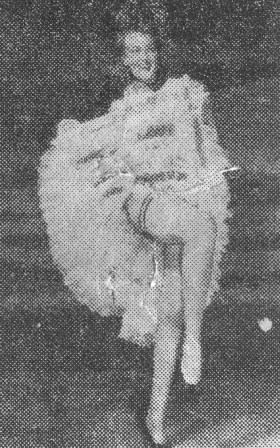 The leggy beauty can-canning above is strictly a G.I. gal.
Her name is June Sabel, veteran of the San Francisco Stage Door Canteen campaign and currently morale booster in the Red Cross at Kunming,
China. The customer, we learn, spent two days making the glass diamond garter she's wearing. Those things require a lot of fittings.
The leggy beauty can-canning above is strictly a G.I. gal.
Her name is June Sabel, veteran of the San Francisco Stage Door Canteen campaign and currently morale booster in the Red Cross at Kunming,
China. The customer, we learn, spent two days making the glass diamond garter she's wearing. Those things require a lot of fittings.
